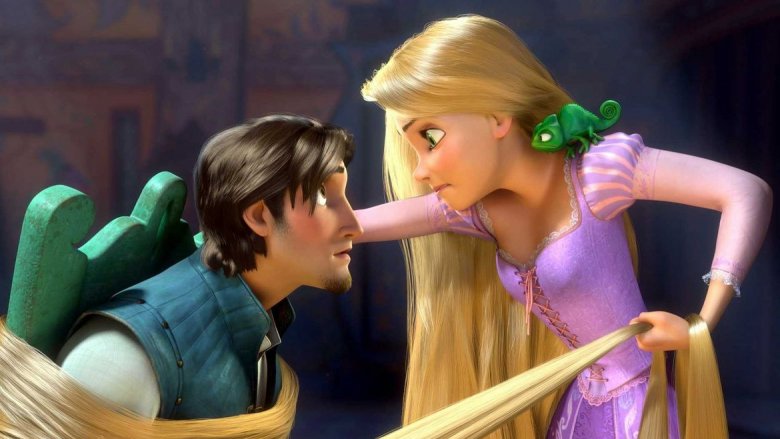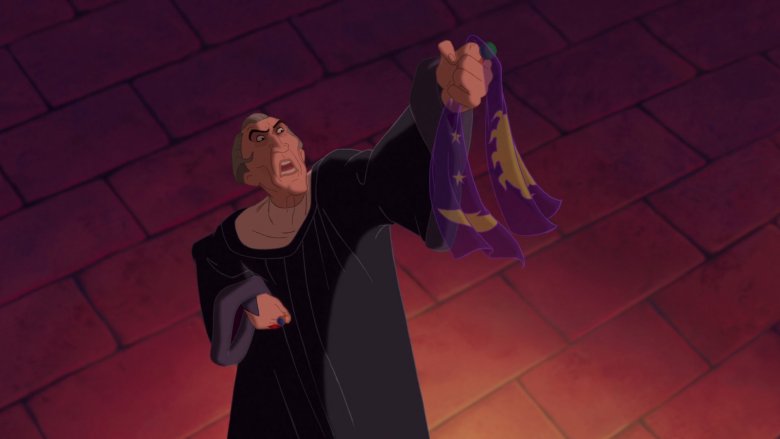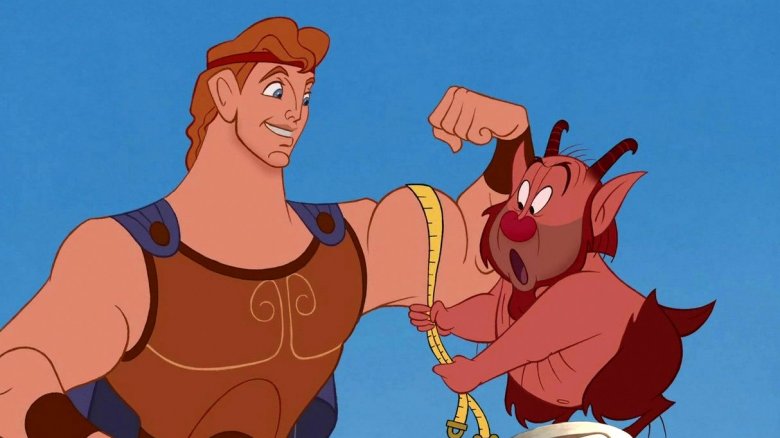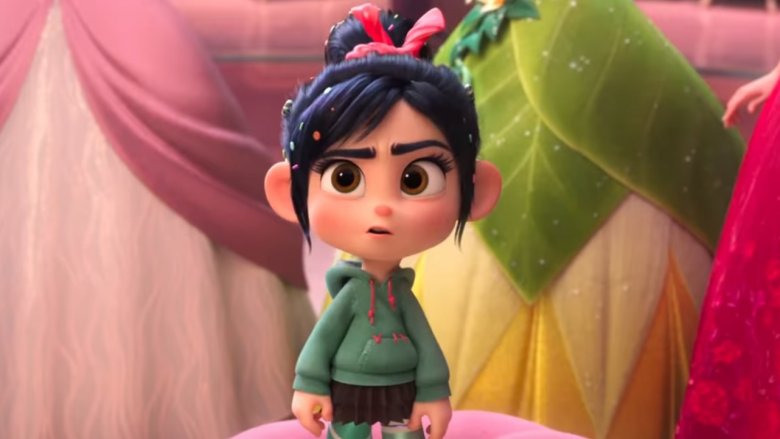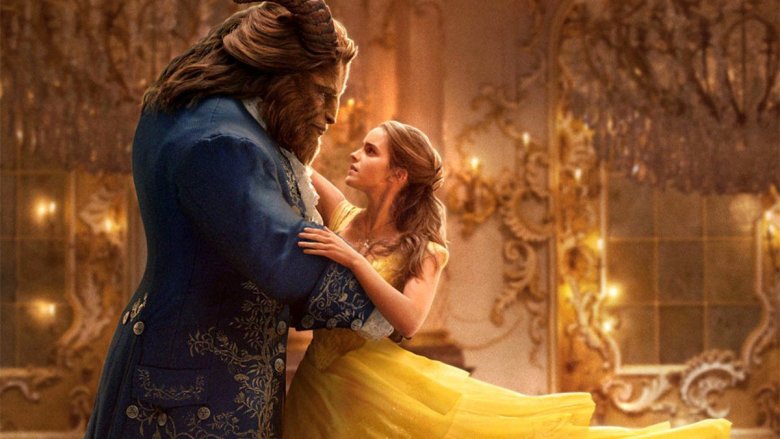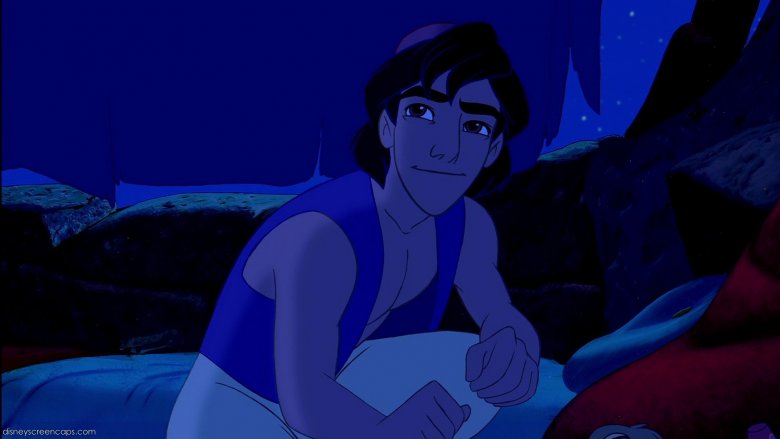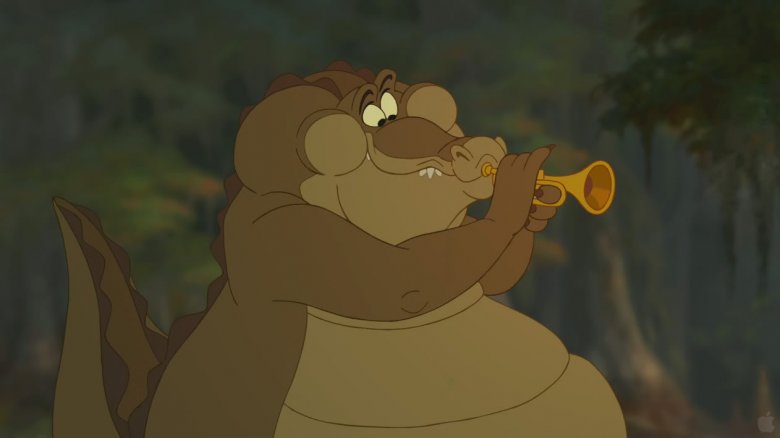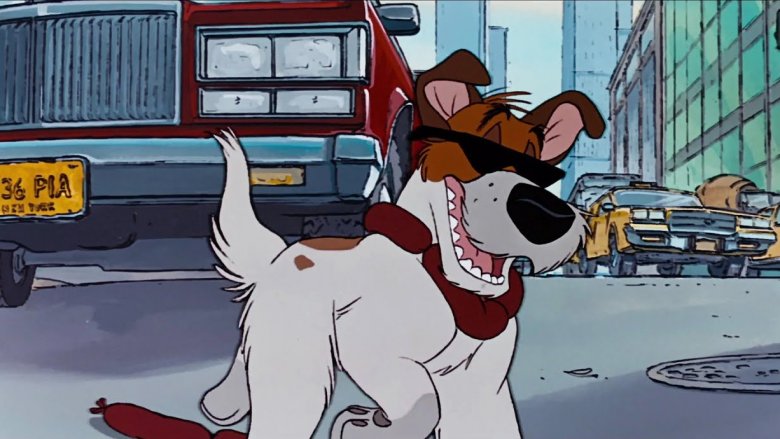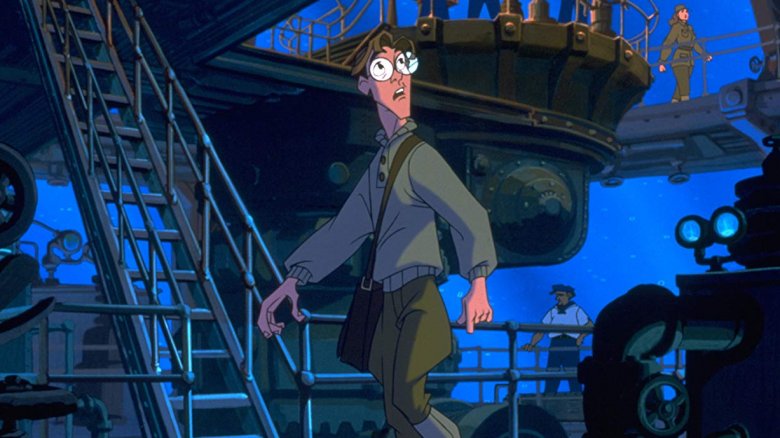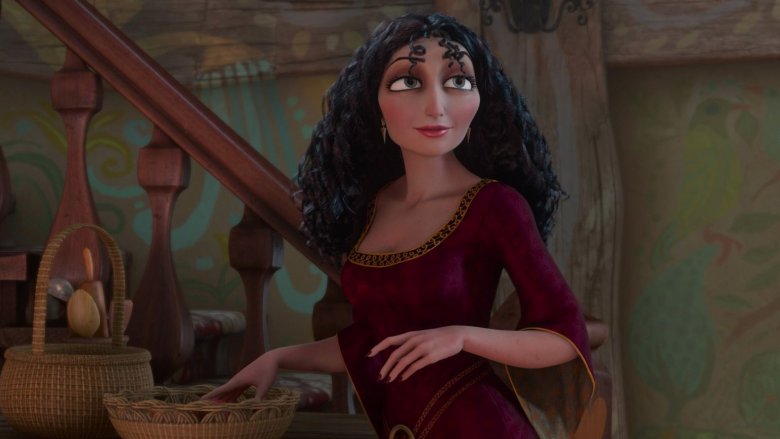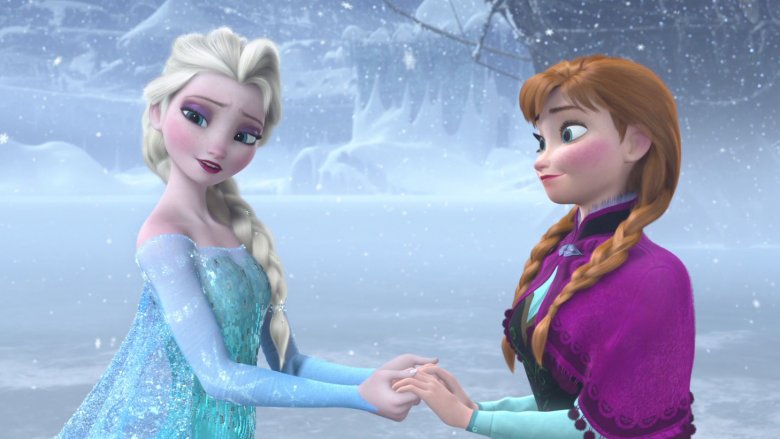Lines In Disney Movies That Mean More Than You Realized
For generations of people all over the world, Disney is a fountain of childhood dreams, happily ever afters, and charmingly docile animal sidekicks. Princesses meet their princes, evil is vanquished, justice is found, and love wins the day. A dream is a wish your heart makes, after all, and if it takes a little more elbow grease than your fleet of crafty mice can handle, there's always a genie lying around somewhere.
But it's not all rainbows, mermaids, and 24-hour engagements in the land of Cinderella and Snow White. In fact, even those most starry-eyed of Disney classics contain nods, references, and outright confrontations of weirder, often darker realities. Sarcasm, irony, and historical fact are as much a part of these movies as sunshine and stallions. Everything from the gruesome parts of original fairy tales to bits of American music history are there to be found by the sharp-eyed viewer, and relished as hitherto unknown dimensions within family-favorite films. Here is a brief sampling of those moments across the Disney canon, summed up in single lines of dialogue.
Frollo's plea for forgiveness
"Hellfire" is undoubtedly one of the greatest Disney villain songs of all time. A tirade against Esmeralda, God, and himself, Frollo veers wildly between desperate desire, pitiful fear, and towering rage. He reaches the apotheosis of his cruelty in this sequence, the curdling of his helpless lust into a twisted hatred for the innocent woman who caused it. Between the haunting lyrics and the terrifyingly infernal animation, it is a stone-cold masterpiece of the animated canon.
It's also a lot more creepy than you realized. The faceless priests chanting beneath Frollo's impassioned pleas for mercy and vengeance, are, in fact, begging God for absolution. The song opens with a selection from the Confiteor prayer for forgiveness from the Catholic Penitential Rite, and continues as Frollo descends further into his figurative hell. The latter half of the song sees the monks chanting "mea culpa, mea maxima culpa" repeatedly, directly translated into "through my fault, through my most grievous fault." They end with a plea for mercy: Frollo begs for divine kindness as the monks sing "Kyrie eleison," or, "Lord, have mercy." Unfortunately, he has no such kindness in his heart for Esmeralda.
Hercules and the Amazons
Hercules put a zany, kinetic spin on the classics of Greek mythology. The muses, who narrate the entire movie, are divas of the highest order. Megara is a sarcastic femme fatale with a complex past. Hercules himself is portrayed as more of a 20th century pop culture icon than a hero of myth, complete with jokes about "Air Herc" sandals and tie-in soft drinks.
The legendary labors of Hercules were no exception to this remixing. Phil, Herc's grizzled coach, informs him at the midpoint of the movie that he needs to "get a girdle from some Amazons" with a lascivious wink. This is, in fact, a nod to Hercules' ninth labor, in which he is commanded by King Eurystheus to fetch a magical belt from Hippolyte, queen of the Amazons. The belt, given to Hippolyte by the war god Ares, might have been handed over peacefully if the goddess Hera had not disguised herself as an Amazon to sow seeds of distrust. In the end, the Amazons attack Hercules, Hippolyte is slain, and the belt is taken. Not the stuff of Disney dreams, but very much the stuff of ancient myth.
Vanellope references video game history
Wreck-It Ralph and its sequel, Ralph Breaks the Internet, are delirious whirlwinds of pop culture. Sonic the Hedgehog delivers PSAs while digital denizens scrawl "AERITH LIVES!" on tunnel walls. The type of personality quizzes that proliferate on your Facebook feed and dodgy email offers of cash for video game tasks are personified as trilling princesses and nasal slumlords. Ralph and Vanellope themselves are embodiments of video game genres, the arcade era and the candy-colored kawaii age respectively.
Ralph Breaks the Internet offers a clever little nod to these origins when Vanellope spies an inflatable gorilla balloon atop a building within Slaughter Race. "Ralph?" she asks it, before realizing that it isn't her goliath friend. In addition to showing how Ralph is on her mind, it also serves as a reference to Ralph's origins. Though the fictional Fix-It Felix Jr. contains a lot of retro DNA, Donkey Kong is undoubtedly the most obvious influence, with Ralph as the titular monkey in a necktie. Happily, he's found life beyond terrorizing the Nicelanders, even if Donkey Kong is still tossing barrels.
Belle asks for a rose
Beauty and the Beasts's 2017 remake was full of ideas that set it apart from the 1991 animated classic. Belle gained a mother, a protofeminist ethos, and a genius for invention all her own. The Beast got a brand new song all about how helplessly in love he is with his comely captive. An opera-singing wardrobe developed a star-crossed romance with a harpsichord. It wasn't exactly new, but it was certainly different.
But Disney did return to the original in one line — the original 18th century fairy tale, that is. In the classic story, Belle, in contrast to her materialistic sisters, asks their traveling father for nothing more than a rose. This bit of the story was excised from the animated version, and though most of the story didn't make it into the 2017 remake — Belle is still an only child with qualities beyond sweet meekness — it did include Belle's request of a rose. This is the rose that, as in the fairy tale, leads to Maurice's entrapment and Belle's trade of her life for his. It's a great incorporation of the foundational tale, and a reminder of just how much can hinge on the simplest request.
Aladdin nods to another classic thief
Aladdin, like most Disney movies, is rooted in classic stories. The principal influence here is, of course, Aladdin and the Magic Lamp, a Middle Eastern folktale canonized as part of The Book of One Thousand and One Nights. But that's not the only influence brought to bear on Disney's version of this ancient story.
No, we're not talking about Genie's many nods to culture high and low. We're talking about that most famous of thieves, the man who suffered for years after stealing a single baguette: Jean Valjean from Victor Hugo's immortal Les Misérables. Aladdin owes a lot to that lovable rogue, but it's most explicitly acknowledged in the quip he lets loose before launching into "One Jump Ahead": "All this for a loaf of bread?" As in Les Mis, so it went in Aladdin. At least he didn't have to contend with Inspector Javert.
The princess and the jazz trumpeter
The Princess and the Frog is one of very few Disney movies to be rooted in a specific place and time. Tiana and Naveen don't gallivant around vaguely medieval forests or distant imaginings of the Middle East — they're in New Orleans, in the early 1920s. Though Naveen's fictional lineage is a more whimsical melange of language and aesthetics, Tiana is rooted in ironclad history. She and her mother live in the very real shadow of New Orleans wealth, she lost her father in World War I, and she is, in fact, based on legendary chef Leah Chase.
Tiana's story isn't the only one rooted in realism, however. Louis, the jazz-loving, trumpet-playing alligator, is on the cutting edge of New Orleans' vibrant music scene of the time. "I know that tune!" he booms in the midst of his introduction. "'Dippermouth Blues!'" "Dippermouth Blues" is, in fact, a 1923 jazz classic, possibly made famous by the character's namesake, Louis Armstrong. Dippermouth was also a nickname of Armstrong's, albeit one less famous than the legendary "Satchmo." No wonder The Princess and the Frog's soundtrack remains a rollicking delight.
Four-legged friends and enemies
Oliver and Company is itself a take on Charles Dickens' beloved Oliver Twist, reimagined as a modern-day New York City saga starring a cast of talking animals. Oliver, our heroic orange kitten, is taken in by the streetwise Dodger and his crew of lovable mutts. It's not a fairy tale, not even based in one — it is, rather, a fable of the times we live in now. Jokes about the subway system, hot dog vendors, and the Manhattan upper crust abound. Sarcasm is welcome here, unlike in the more earnest Disney classics, and irony is frequently invited along as well.
One of the most vivid examples of this wry attitude is in the moment Dodger calls Old Louie the hot dog vendor "a well-known enemy of the four-legged world." Old Louie is, in fact, voiced by Frank Welker, a legendary voice actor probably best known for voicing, you guessed it, the four-legged world. You know Welker as Scooby Doo (and his human pal Fred), Abu, Jabberjaw, Dynomutt, Santa's Little Helper, and an absolute avalanche of others. He may not be giving Dodger free snacks, but he's probably voicing a lot of his tail-wagging friends.
Atlantis on the eve of war
Atlantis: The Lost Empire is a fascinating deviation from the Disney canon. A sci-fi tale set in 1914, it follows the journey of a ragtag bunch of mechanics, scientists, and engineers to the lost kingdom of Atlantis, led by excitable linguist Milo Thatch. Though it's perfectly fine for children to watch, it confronts them with phrases like "adventure capitalist" and the specter of crumbling societies. In the end, the enemy isn't just one man bent on destruction — it's the concept of greed itself, fulfilled by any means necessary.
One line highlights this in particular. When Milo realizes he's led the mercenary Rourke right to Atlantis' power source (which Rourke seeks to steal and sell to the highest bidder), Milo exclaims that he's given away the radiant crystal to "some nutcase who's probably going to sell it to the Kaiser!" He is referring here to Kaiser Wilhelm II, then the center of the burgeoning crisis that would soon explode into World War I. The war's looming darkness casts a pall over the entire movie — it is largely unsaid why Rourke is so especially interested in selling a source of energy, but the audience knows it's because the world is clamoring for it with a unique intensity. This is the only line in which it is stated outright, but Milo knows exactly what's coming as a student of history, and so he grasps the awful truth of what he has done.
Rapunzel's growing pains
Tangled, like so many Disney stories, is a gentler version of brutal folktale, passed down through generations that did not know the comforts of penicillin and electricity. Its lessons, as such, are appropriately harsh and sanded down by the Mouse House, which seeks to entertain more often than instruct. Now and then, however, Disney lets a little of the original peek through and adds a piquant note to an otherwise mild stew. Recall Maleficent summoning "all the powers of Hell" against Prince Phillip, or the naked fact of the Evil Queen's desire for Snow White's literal heart in a box.
One cloaked example of this comes from Mother Gothel. In "Mother Knows Best," her chillingly cheery entreaty upon Rapunzel to do as she says or suffer the consequences, she sings, "Plus, I believe, gettin' kinda chubby!" as she prods at the skin beneath Rapunzel's chin. This is a cruel jab at her faux-daughter's body image, but it's also a reference to the original tale. After Rapunzel has been meeting with the prince in secret for some time, Gothel (Dame instead of Mother in the classic German) discovers her daughter outgrowing her gowns. Rapunzel and the prince have been doing more than singing songs together, and she has become pregnant. Calamity ensues, Rapunzel's hair is cut off, the prince is blinded, and eventually she gives birth to twins. Good thing Flynn Rider only had to contend with a frying pan and a chameleon.
The real conflict at the heart of Arendelle
In the midst of Frozen's snow-swept conflict, a couple of men are engaged in their own drama. Left to cope with Elsa's winter, they are glimpsed in passing. One exclaims, No, no, you've got the bark facing down! The bark needs to be face up!" The other man frowns and replies, "Down is drier!" They tussle, but are quickly forgotten in the scope of the wider story as another example of the mess that needs to be fixed. Alas, poor Arendelle, rent by tensions large and small!
Actually, the moment is a cheeky nod a real world debate. In 2013, Norway was divided by a fierce battle over — you guessed it — the best way to stack firewood. Sparked by a TV broadcast starring Lars Mytting, author of the bestselling book Solid Wood: All About Chopping, Drying and Stacking Wood — and the Soul of Wood-Burning, 20 percent of the Scandinavian nation tuned in to the program. Unsurprisingly, arguments sprung up like mushrooms in the wake of a fierce rain, all consumed with the best ways to stack wood, dry wood, and burn wood. If only the denizens of Arendelle could have tuned in — perhaps a lively debate could have helped them relax as they waited for our heroes to save the day.
